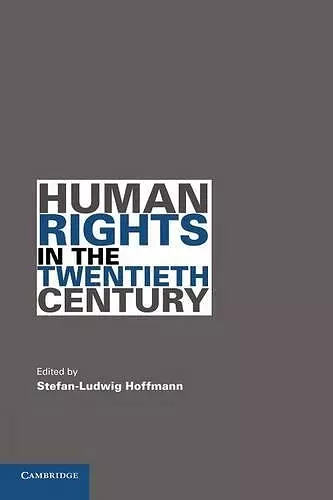Human Rights in the Twentieth Century
Format:Paperback
Publisher:Cambridge University Press
Published:13th Dec '10
Currently unavailable, and unfortunately no date known when it will be back
This paperback is available in another edition too:
- Hardback£88.00was £88.00(9780521194266)

This book examines how human rights came to define the bounds of universal morality during the political crises and conflicts of the twentieth century.
By focusing on specific instances of assertions or violations of human rights during the past century, this volume analyzes the place of human rights in the various arenas of global politics, providing an alternative framework for understanding the political and legal dilemmas that emerged from these conflicts.Has there always been an inalienable 'right to have rights' as part of the human condition, as Hannah Arendt famously argued? The contributions to this volume examine how human rights came to define the bounds of universal morality in the course of the political crises and conflicts of the twentieth century. Although human rights are often viewed as a self-evident outcome of this history, the essays collected here make clear that human rights are a relatively recent invention that emerged in contingent and contradictory ways. Focusing on specific instances of their assertion or violation during the past century, this volume analyzes the place of human rights in various arenas of global politics, providing an alternative framework for understanding the political and legal dilemmas that these conflicts presented. In doing so, this volume captures the state of the art in a field that historians have only recently begun to explore.
'Human Rights in the Twentieth Century is a landmark in a field of supreme importance. It is enlightening and therefore disenchanting in the most constructive sense. It brings together a fine group of scholars, mainly historians, to provide historical perspective on a topic that is sorely lacking it and shows the contingency of the deployment of human rights as a political language, the varied roots of that language, and the diversity of objects that it can address.' Donald Bloxham, University of Edinburgh
'This is an outstanding collection of essays on various aspects of human rights history in the twentieth century. The essays cover a wide range topically - from the intellectual linealogy of the human rights concept to its relationship to states in specific circumstances - chronologically and geographically and are of uniformly high quality. They make exciting reading and together contribute enormously to helping understand one of the most vital and important - but hitherto insufficiently studied - developments in recent history.' Akira Iriye, Harvard University
'This is an impressive collection on a timely and important topic. Its strengths are considerable, including both stimulating synthetic 'think-pieces' on the changing meanings of 'human rights' and archivally based studies of how, and with what results, 'rights-talk' was mobilized by different groups and in different situations.' Susan Pedersen, Columbia University
'At long last we have a book that takes a critical approach to the history of human rights. Stefan-Ludwig Hoffmann has put together a stellar cast of historians whose topics range widely around the globe. His own introduction raises the scholarship on human rights to a new level. This is the book that scholars and practitioners will need to read and debate.' Eric D. Weitz, University of Minnesota
'This volume makes an invaluable contribution to the study of human rights by treating them historically, foregoing familiar triumphalist narratives about steady progress in favour of detailed examinations of the contingent usage of human rights as political language and instrument.' Johannes Paulmann, History Workshop Journal
ISBN: 9780521142571
Dimensions: 235mm x 155mm x 19mm
Weight: 520g
366 pages